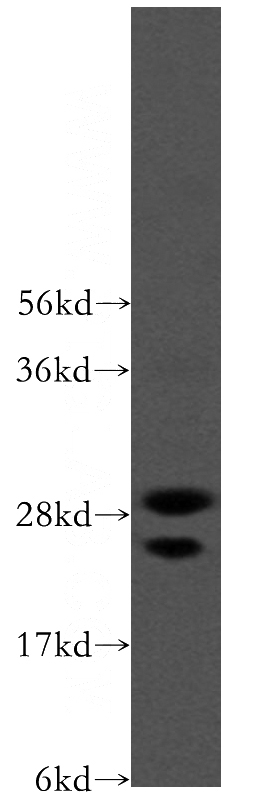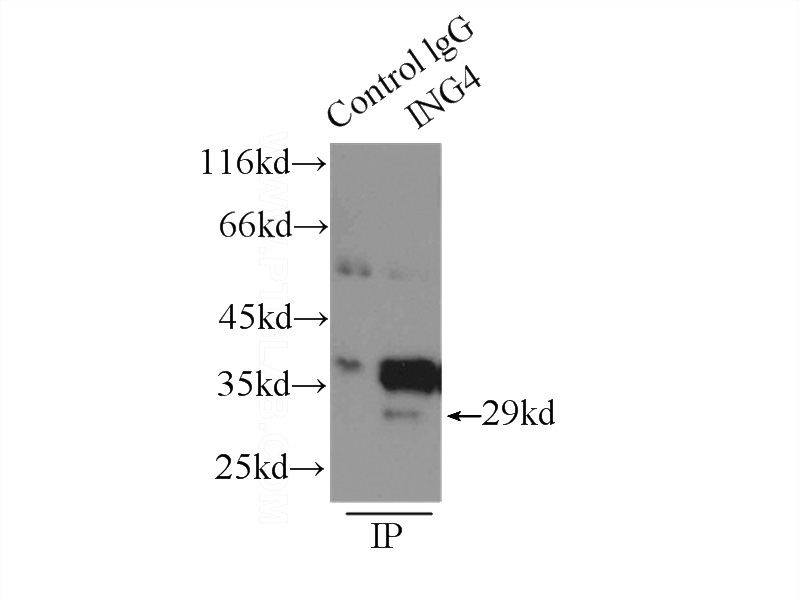-
Product Name
ING4 antibody
- Documents
-
Description
ING4 Rabbit Polyclonal antibody. Positive WB detected in HEK-293 cells, HeLa cells. Positive IP detected in HEK-293 cells. Observed molecular weight by Western-blot: 29kd
-
Tested applications
ELISA, WB, IP
-
Species reactivity
Human,Mouse,Rat; other species not tested.
-
Alternative names
ING4 antibody; Inhibitor of growth protein 4 antibody; my036 antibody; p29ING4 antibody
-
Isotype
Rabbit IgG
-
Preparation
This antibody was obtained by immunization of ING4 recombinant protein (Accession Number: NM_001127582). Purification method: Antigen affinity purified.
-
Clonality
Polyclonal
-
Formulation
PBS with 0.1% sodium azide and 50% glycerol pH 7.3.
-
Storage instructions
Store at -20℃. DO NOT ALIQUOT
-
Applications
Recommended Dilution:
WB: 1:200-1:2000
IP: 1:200-1:1000
-
Validations

HEK-293 cells were subjected to SDS PAGE followed by western blot with Catalog No:111795(ING4 antibody) at dilution of 1:200

IP Result of anti-ING4 (IP:Catalog No:111795, 3ug; Detection:Catalog No:111795 1:200) with HEK-293 cells lysate 2700ug.
-
Background
ING4, also named as p29ING4, belongs to the ING family. It is a component of the HBO1 complex which has a histone H4-specific acetyltransferase activity, a reduced activity toward histone H3 and is responsible for the bulk of histone H4 acetylation in vivo. It may inhibit tumor progression by modulating the transcriptional output of signaling pathways which regulate cell proliferation. ING4 can suppress brain tumor angiogenesis through transcriptional repression of RELA/NFKB3 target genes when complexed with RELA. It may also specifically suppress loss of contact inhibition elicited by activated oncogenes such as MYC. Represses hypoxia inducible factor's (HIF) activity by interacting with HIF prolyl hydroxylase 2 (EGLN1). ING4 is a tumor suppressor gene that interacts with NFkB and represses its transcriptional activity. Several lines of evidence suggest that the tumor suppressor gene ING4, NFkB and its target genes matrix metalloproteases MMP-2, MMP-9 and urokinase plasminogen activator (u-PA) are critically involved in tumor invasion. This antibody is a rabbit polyclonal antibody raised against full length human ING4 antigen.
-
References
- Nozell S, Laver T, Moseley D. The ING4 tumor suppressor attenuates NF-kappaB activity at the promoters of target genes. Molecular and cellular biology. 28(21):6632-45. 2008.
- Li J, Martinka M, Li G. Role of ING4 in human melanoma cell migration, invasion and patient survival. Carcinogenesis. 29(7):1373-9. 2008.
- Tzouvelekis A, Aidinis V, Harokopos V. Down-regulation of the inhibitor of growth family member 4 (ING4) in different forms of pulmonary fibrosis. Respiratory research. 10:14. 2009.
- Klironomos G, Bravou V, Papachristou DJ. Loss of inhibitor of growth (ING-4) is implicated in the pathogenesis and progression of human astrocytomas. Brain pathology (Zurich, Switzerland). 20(2):490-7. 2010.
- You Q, Wang XS, Fu SB, Jin XM. Downregulated expression of inhibitor of growth 4 (ING4) in advanced colorectal cancers: a non-randomized experimental study. Pathology oncology research : POR. 17(3):473-7. 2011.
- Tzouvelekis A, Ntolios P, Karameris A. Expression of hypoxia-inducible factor (HIF)-1a-vascular endothelial growth factor (VEGF)-inhibitory growth factor (ING)-4- axis in sarcoidosis patients. BMC research notes. 5:654. 2012.
- Mishima Y, Miyagi S, Saraya A. The Hbo1-Brd1/Brpf2 complex is responsible for global acetylation of H3K14 and required for fetal liver erythropoiesis. Blood. 118(9):2443-53. 2011.
- Berger PL, Frank SB, Schulz VV. Transient induction of ING4 by Myc drives prostate epithelial cell differentiation and its disruption drives prostate tumorigenesis. Cancer research. 74(12):3357-68. 2014.
Related Products / Services
Please note: All products are "FOR RESEARCH USE ONLY AND ARE NOT INTENDED FOR DIAGNOSTIC OR THERAPEUTIC USE"
